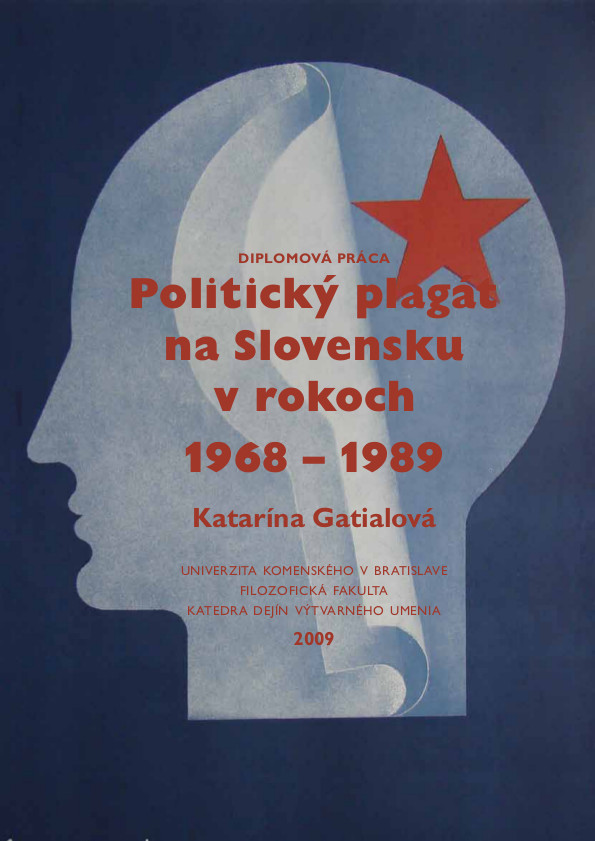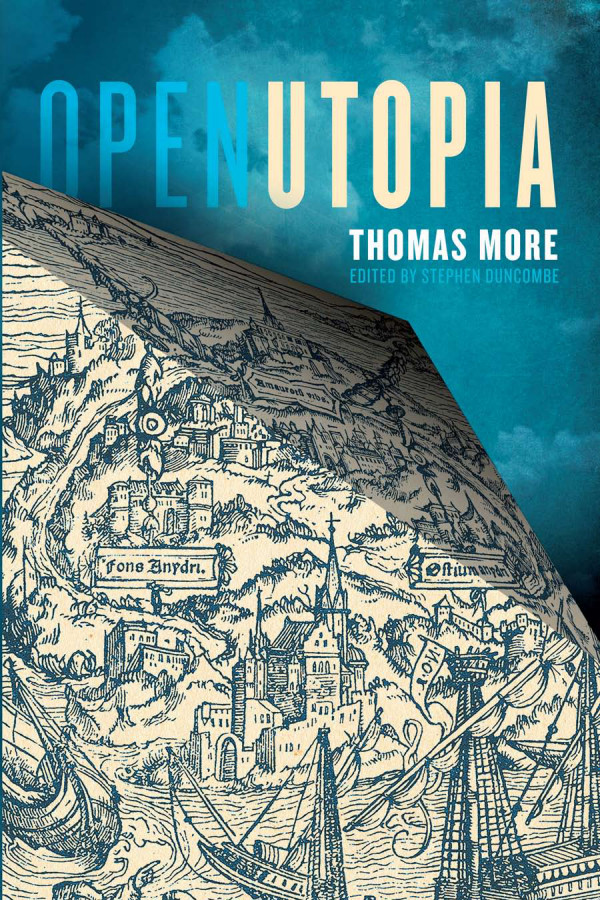Katarína Gatialová: Politický plagát na Slovensku v rokoch 1968 – 1989 (2009) [Slovak]
Filed under thesis | Tags: · 1960s, 1970s, 1980s, art history, graphic design, ideology, politics, propaganda, slovakia, totalitarianism

“Politický plagát na Slovensku v období 70. a 80. rokov 20. storočia patrí spolu s ďalšími prejavmi oficiálneho umenia k sporným bodom našej kultúrnej histórie. Plagáty, produkované a podporované oficiálnou štátnou politikou, boli jednou z vizuálnych dominánt tejto doby, avšak bez výraznejšieho agitačného vplyvu na väčšinu obyvateľstva. Charakteristické znaky a symbolika angažovanej plagátovej tvorby, ale tiež jej obsahová „vyprázdnenosť“, zrkadlia obdobie svojho vzniku. Plagáty boli exponovanou oficiálnou maskou režimu. Dobová nadprodukcia politických plagátov počas normalizácie spôsobila ich výtvarnú aj obsahovú devalváciu. V súčasnosti sa tento okruh prác dá považovať za definitívne uzavretý, bez autentického pokračovania alebo priameho dosahu na dnešnú výtvarnú tvorbu. Ideologické pozadie politických plagátov však spôsobilo na jednej strane neskorší nezáujem, až odpor voči danej problematike, na druhej strane nejasnosti a skreslenie informácií o tomto druhu tvorby. Dnešná kunsthistória takmer ignoruje angažované plagáty obdobia 70. a 80. rokov. Názor širšej verejnosti závisí do znaènej miery od veku. Predstavitelia staršej generácie, ktorí mali možnosť stretávať sa vo svojom každodennom živote v predprevratovom období s týmito artefaktmi, nedokážu zaujať neutrálne stanovisko a negatívne hodnotia problematiku ako celok. Predstavitelia mladšej generácie, ktorí skúmané obdobie osobne nezažili, prípadne len v ranom detstve, vnímajú tieto diela oficiálnej kultúry nezaťažene a veľmi pozitívne. Dostupné informácie sú však obmedzené, názory mladých ľudí sú preto mnohokrát deformované populárnymi výstupmi na túto tému. Politické plagáty sa spolu s ďalšími prejavmi propagandy a oficiálnej kultúry minulého režimu stali často len akousi zábavnou kuriozitou. Názory na tematiku politických plagátov teda oscilujú medzi dvoma krajnými bodmi – tzv. ostalgickým obdivom a jej radikálnym odsúdením. V tejto diplomovej práci sa pokúsim odpútať sa od oboch vyhranených názorových polôh, mojou snahou bude pozrieť sa na angažované plagáty 70. a 80. rokov 20. storočia bez predsudkov a uvažovať o nich z čo najväčšieho nadhľadu.”
Master thesis
Art History Dept, Faculty of Philosophy, Comenius University in Bratislava, 2009
Supervisor: Alexandra Kusá
159 pages
video lecture (Public Face of Power, Communist Propaganda Posters from Czechoslovakia and Central Europe in the Second Half of the 20th Century) [English]
Comment (0)Andrew Barry: Political Machines: Governing a Technological Society (2001)
Filed under book | Tags: · citizenship, european union, governance, intellectual property, interactivity, neoliberalism, networks, politics, society, sociology of science, technology

Technology assumes a remarkable importance in contemporary political life. Today, politicians and intellectuals extol the virtues of networking, interactivity and feedback, and stress the importance of new media and biotechnologies for economic development and political innovation. Measures of intellectual productivity and property play an increasingly critical part in assessments of the competitiveness of firms, universities and nation-states. At the same time, contemporary radical politics has come to raise questions about the political preoccupation with technical progress, while also developing a certain degree of technical sophistication itself.
In a series of in-depth analyses of topics ranging from environmental protest to intellectual property law, and from interactive science centres to the European Union, this book interrogates the politics of the technological society. Critical of the form and intensity of the contemporary preoccupation with new technology, Political Machines opens up a space for thinking the relation between technical innovation and political inventiveness.
Publisher Continuum International Publishing Group, 2001
ISBN 0485006340, 9780485006346
320 pages
PDF (no OCR)
Comment (1)Thomas More: Open Utopia (1516/2012)
Filed under book | Tags: · politics, religion, society, utopia

Opinion polls, volatile voting patterns, and street protests demonstrate widespread dissatisfaction with the current system, yet the popular response so far has largely been limited to the angry outcry of No! But negation, by itself, affects nothing. The dominant system doesn’t dominate because people agree with it; it rules because we’re convinced there is no alternative.
We need to be able to imagine a radical alternative – a Utopia – yet we are haunted by the disasters of “actually existing” Utopias of the past century, from fascism to authoritarian socialism. In this re-issue of Thomas More’s generative volume, scholar and activist Stephen Duncombe re-imagines Utopia as an open text, one designed by More as an imaginal machine freeing us from the tyranny of the present while undermining master plans for the future.
Open Utopia is the first complete English language edition of Thomas More’s Utopia that honors the primary precept of Utopia itself: that all property is common property. Open Utopia, licensed under Creative Commons, is free to copy, to share, to use. But Utopia is more than the story of a far-off land with no private property. It is a text that instructs us how to approach texts, be they literary or political, in an open manner: open to criticism, open to participation, and open to re-creation. Utopia is no-place, and therefore it is up to all of us to imagine it.
In this volume, and its accompanying website, Utopia is re-imagined and brought into the digital age as a participatory technology for undermining authority and facilitating new imagination.
Edited and With an Introduction by Stephen Duncombe
Publisher Minor Compositions, Wivenhoe/New York/Port Watson, an imprint of Autonomedia, NY, 2012
Creative Commons Attribution-ShareAlike 3.0 Unported License
ISBN 9781570272455
242 pages
PDF
View online (from the publisher)

